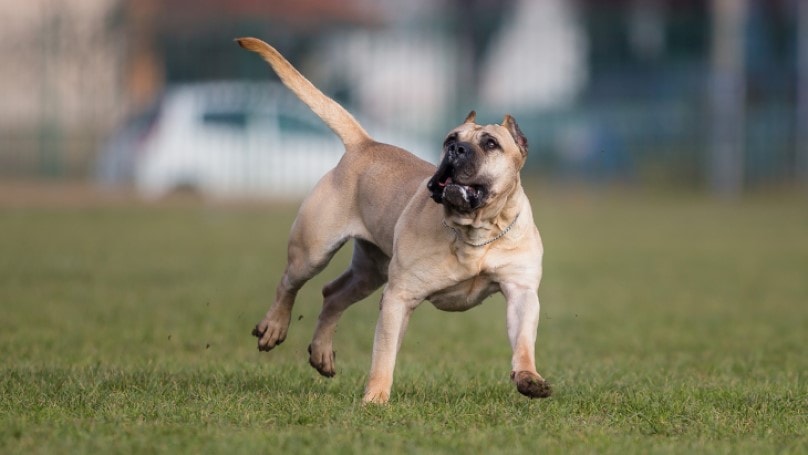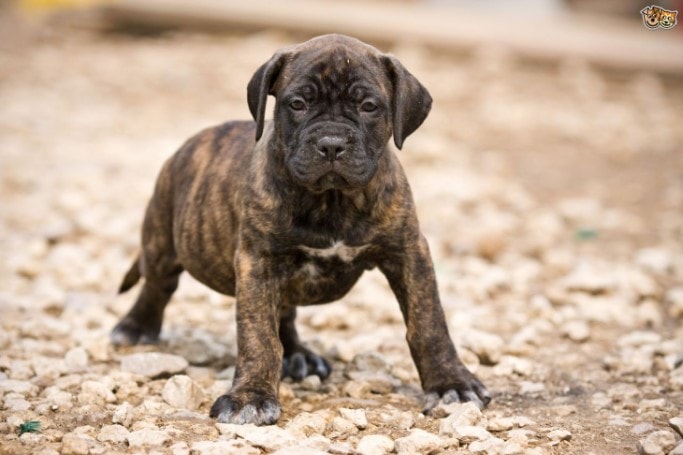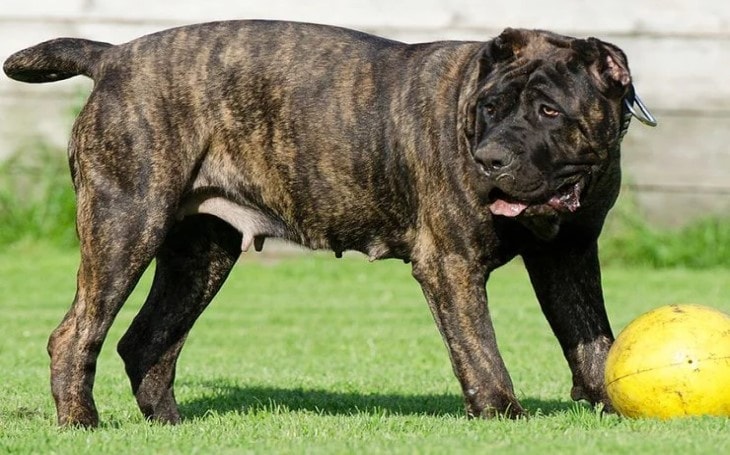Perro de Presa Canario Dog Breed Information
| Country of Origin | Canary Island (Spain) |
| Nicknames and Other Names | Presa Dogo Canario Presa Canario Canarian Molosser Canary Catch Dog |
| Scientific Name | Canis lupus familiaris |
| Breed Type | Cross Breed |
| Group | Guardian Dog |
| Bred For | Working livestock |
| Size | Large-sized |
| Recognized By | UKC, AKC, FCI |
| Life Span | 9-11 years |
| Ideal Weight | 84-110 pounds (male and female) |
| Ideal Height | 22-26 inches (male and female) |
| Fur Type | Short, single coat, slightly coarse |
| Common Colors | Brown, Gold, Orange, Tiger, Silver, Fawn |
| Markings | White markings Brindle markings |
| Availability | Moderately available |
| Achievements | None |
| Suitable for Apartments | No |
| Used in World War | No |
| Most Similar To | Cane Corso |
The Perro de Presa Canario is a rare mastiff dog with a very powerful and complex personality. They are used as “catch dogs”, chasing cattle, hogs, and killing strange dogs.
These herding dogs are large in size with a massive head and heavy rectangular body. They are slightly longer than their height with a broad, deep chest and their tail is moderately high which reaches to the hock. Overall the Perro de Presa Canario dog’s impression is that of an imposing, solid guard dog.
Origin & History Of Perro de Presa Canario
The Perro de Presa Canario is believed to date to the 15th and 16th centuries. They were descended from the Canary Islands by the Spanish conquistadores. There they used to guard farms, and used to drive off and killed other dogs.
The Perra de Preso was developed by the contribution of various other breeds which include Iberian Presa, a mastiff type and other types of bulldogs know as Alonas. Together with that a sheepdog called Bardino Majorero also contributed it genes in their development.
By the year 1940, the Perro de Presa Canario started to get extinct but later it was revived again in the 1970s. The Perro de Presa Canario was
Are They Child-Friendly?
Talking about their behavior with children, it totally depends on how you raise your Perra de Presa Canario. If they are trained and socialized properly since their puppy age, they can be an excellent playmate for your kids and will always protect them if a
One thing you have to make sure is that never allow your kids to be lower than the dog, this will help you step over them. As they have the
Temperament, Personality & Behavior
Temperament: The Temperament of Perro de Presa is calm

Image Via Dogocanarianet
Personality: The Perro de Presa Canario has a bold, active, athletic and loving personality. These dogs develop a strong bond to their family and will protect them from any threat. Despite being large in size, they do moderately well for apartment life, if sufficiently exercised. Dogs of this breed are very active by nature so they perform well at outdoors.
Behavior:The Perro de Presa is an aggressive dog who usually does well with its family members but are suspicious around
With proper training and
Training
Training the Perro De Perse is quite challenging as they are quite dominant. They require a confident trainer who can give them consistent and firm training. Treats can be a good idea to motivate them but too
Because of their strong-willed nature, their training will continue throughout their life.
Facts
Interesting Facts About Perro de Presa Canaria:
- The Perro de Presa Canaria loves water and can be an excellent swimmer.
- They can tolerate heat more than other mastiff-type breeds.
- The name, “Perro de Presa Canario” comes from the Spanish language, meaning “Canarian catch dog.
- This breed is banned from ownership in Australia and New Zealand, largely because the administration of these countries believe them to be aggressive.
Health
| General Health | Healthy |
| Common Health Issues | Cryptorchidism, Bloat, Hypothyroidism, Luxating Patella, Obsessive-Compulsive Disorder, Dilated Cardiomyopathy |
| Hypoallergenic | No |
| Vaccination Required | Rabies, Canine Parvovirus, Canine Parainfluenza, Canine Distemper, Kennel Cough, Canine Coronavirus, Leptospirosis |
| Shedding | None to Minimal |
| Drooling | Average Drooler |
| Grooming | Easy and Minimal Grooming Required |
| Weight Gain Potential | High |
| Separation Anxiety | Moderate Chance |
| Allergies | None |
| Diets and Supplements | Protein: 27% Fat: 14% Digestive Enzymes Multivitamins Fish Oil |
Common health issues of Perro de Preso Canaria are:
- Elbow Dysplasia: Abnormalities in the elbow joint in the dog
- Panosteitis: A painful condition
characterized by limping and lameness. - Hypothyroidism: Hypothyroidism, a common disorder in many purebred dogs, involves the insufficient activity of the thyroid gland
- Patellar Luxation: More common in small dog breeds, patellar luxation (or slipped kneecap) have been cited in the Perro de Presa Canario, the lateral form, luxation, where the patella slips to the outside, being more common.
Color Pattern
The Perro de Presa Canaria re found in various colors which include:
- Black
- Brindle
- Fawn
- Silver Fawn
- Red Fawn
- Red Brindle
Puppy Price
The Perro de Presa Canario dogs give birth upto 7-9 puppies at a time.

The Price of Perro de Presa Canaria starts from $200 depending on the breeder as well as the quality of the breed, but if you want to buy the purest breed, it might cost you somewhere between $2500.
Which Dogs Are they Similar To?
Dogs similar to Perro de Presa Canaria are:
- Cane Corso
- Dogo Argentino
- Rottweiler
- Bull Mastiff
- English Mastiff
- Caucasian Shepherd Dog
Visit Doglime For More Dog Breed Information.
Tags











One thought on “Perro de Presa Canario Dog Breed Information”